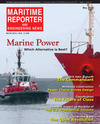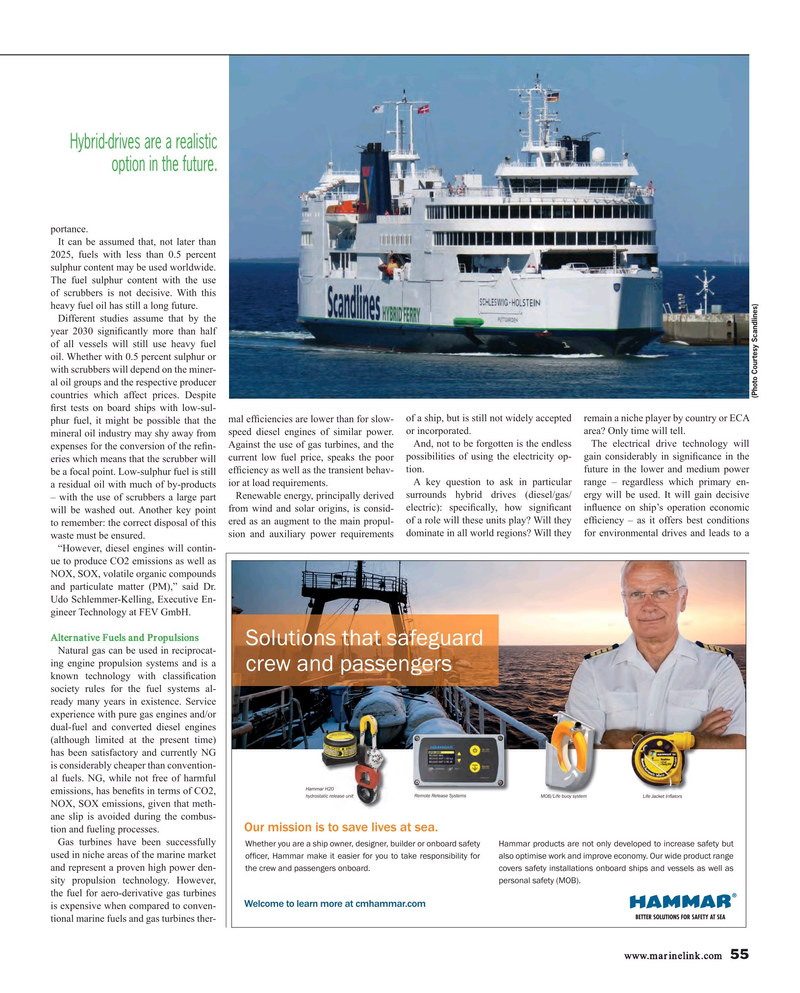
Page 55: of Maritime Reporter Magazine (May 2016)
The Marine Propulsion Edition
Read this page in Pdf, Flash or Html5 edition of May 2016 Maritime Reporter Magazine
Hybrid-drives are a realistic option in the future. portance.
It can be assumed that, not later than 2025, fuels with less than 0.5 percent sulphur content may be used worldwide.
The fuel sulphur content with the use of scrubbers is not decisive. With this heavy fuel oil has still a long future.
Different studies assume that by the year 2030 signi? cantly more than half of all vessels will still use heavy fuel oil. Whether with 0.5 percent sulphur or with scrubbers will depend on the miner- al oil groups and the respective producer (Photo Courtesy Scandlines) countries which affect prices. Despite ? rst tests on board ships with low-sul- phur fuel, it might be possible that the mal ef? ciencies are lower than for slow- of a ship, but is still not widely accepted remain a niche player by country or ECA mineral oil industry may shy away from speed diesel engines of similar power. or incorporated. area? Only time will tell.
Against the use of gas turbines, and the And, not to be forgotten is the endless The electrical drive technology will expenses for the conversion of the re? n- eries which means that the scrubber will current low fuel price, speaks the poor possibilities of using the electricity op- gain considerably in signi? cance in the be a focal point. Low-sulphur fuel is still ef? ciency as well as the transient behav- tion. future in the lower and medium power a residual oil with much of by-products ior at load requirements. A key question to ask in particular range – regardless which primary en-
Renewable energy, principally derived surrounds hybrid drives (diesel/gas/ ergy will be used. It will gain decisive – with the use of scrubbers a large part will be washed out. Another key point from wind and solar origins, is consid- electric): speci? cally, how signi? cant in? uence on ship’s operation economic to remember: the correct disposal of this ered as an augment to the main propul- of a role will these units play? Will they ef? ciency – as it offers best conditions sion and auxiliary power requirements dominate in all world regions? Will they for environmental drives and leads to a waste must be ensured.
“However, diesel engines will contin- ue to produce CO2 emissions as well as
NOX, SOX, volatile organic compounds and particulate matter (PM),” said Dr.
Udo Schlemmer-Kelling, Executive En- gineer Technology at FEV GmbH.
Alternative Fuels and Propulsions
Solutions that safeguard
Natural gas can be used in reciprocat- ing engine propulsion systems and is a
FUHZDQGSDVVHQJHUV known technology with classi? cation society rules for the fuel systems al- ready many years in existence. Service experience with pure gas engines and/or dual-fuel and converted diesel engines (although limited at the present time) has been satisfactory and currently NG is considerably cheaper than convention- al fuels. NG, while not free of harmful
Hammar H20 emissions, has bene? ts in terms of CO2, hydrostatic release unit Remote Release Systems MOB/Life buoy system /LIH-DFNHW,QÁDWRUV
NOX, SOX emissions, given that meth- ane slip is avoided during the combus-
Our mission is to save lives at sea.
tion and fueling processes.
Gas turbines have been successfully
Whether you are a ship owner, designer, builder or onboard safety +DPPDUSURGXFWVDUHQRWRQO\GHYHORSHGWRLQFUHDVHVDIHW\EXW used in niche areas of the marine market
RIÀFHU+DPPDUPDNHLWHDVLHUIRU\RXWRWDNHUHVSRQVLELOLW\IRU DOVRRSWLPLVHZRUNDQGLPSURYHHFRQRP\2XUZLGHSURGXFWUDQJH and represent a proven high power den-
WKHFUHZDQGSDVVHQJHUVRQERDUG FRYHUVVDIHW\LQVWDOODWLRQVRQERDUGVKLSVDQGYHVVHOVDVZHOODV
SHUVRQDOVDIHW\02% sity propulsion technology. However, the fuel for aero-derivative gas turbines
Welcome to learn more at cmhammar.com is expensive when compared to conven- tional marine fuels and gas turbines ther- www.marinelink.com 55
MR #5 (50-57) V2.indd 55 5/4/2016 1:28:46 PM

 54
54

 56
56
